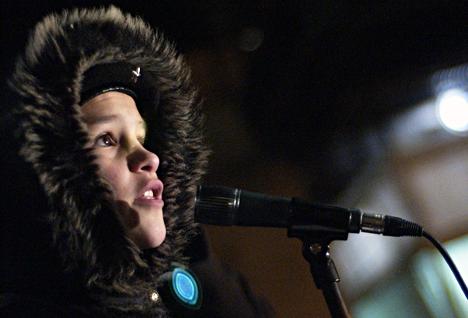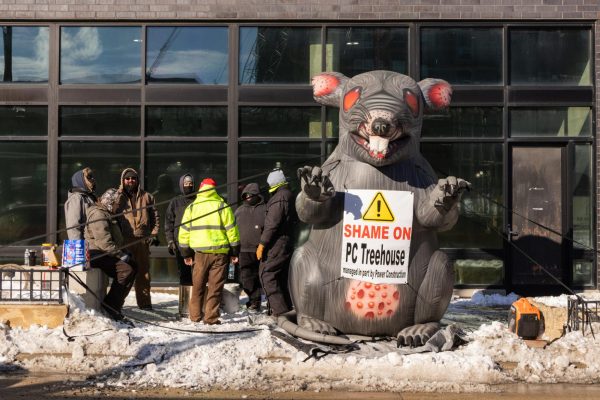Protesters march on Chicago
Mar 16, 2007
Last updated on May 12, 2016 at 08:57 a.m.
CHICAGO — Eleven-year-old Haydee Marrino looked up at her dad, who had begun the opening riffs. Thousands of people had their eyes on the stage, as she took a breath and started singing:
“Imagine there’s no heaven. It’s easy if you try.”
Three minutes later, as she sang the last bars of the popular John Lennon song, the crowd erupted in applause, waving their signs, as Haydee and her father Ramon handed the microphone back to the emcee.
“I like singing with my dad,” Haydee said.
Get The Daily Illini in your inbox!
“She asked me to come, I don’t bring her,” said Ramon, who moved to Chicago from Mexico City in 1996.
But the duo wasn’t putting on a concert for a crowd of fans. They, like the rest of the 4,000 people in front of them, had come to protest the war in Iraq at the Richard J. Daley Center in downtown Chicago on Tuesday. The rally was the last event of a day filled with protesting and marching up and down the streets of downtown.
Crowds of all ages took to the roads with signs, banners and chants as they peacefully condemned the United States’ foreign policy, and brought some of the largest thoroughfares in downtown Chicago to a virtual standstill. Union leaders, veterans, students and immigrants from all over the world were among the throngs of people who called for the immediate removal of troops and the impeachment of President George W. Bush.
The Chicago protest happened one day after the four-year anniversary of the beginning of the Iraq war, and coincided with protests all across the country.
Students at the University of Illinois at Chicago began the day of protest at 11:30 a.m. with an organized walkout from classes. Other students from colleges and universities in the Chicago area and area high schools gathered at the University Center on State Street and Congress Parkway at 4 p.m. to began marching and chanting against the war.
James Ewert, senior at Columbia College in Chicago, came to the student-led rally at the University Center armed with American flags. He laid a PVC pipe on the ground and carefully duct taped each flag to the pipe upside down, the nautical signal for distress. The top flag was attached right side up, but instead of stars, it had several different corporate symbols.
“America is in distress, and corporate America is winning,” Ewert said. “I don’t like feeling lied to, taken advantage of. I hope to see a lot of people come out who mean what they’re saying, like I do.”
Ahndie Sprattlang, sophomore at Harold Washington College in Chicago, had recently returned from a march on the Pentagon, which was primarily lead by students. Sprattlang was at the Chicago protest passing out stickers calling for the impeachment of the president, and was one of the most animated speakers and chanters when it was her turn with the megaphone.
“This war is immoral, unjust and illegal and it has to stop,” she said. “I can’t stand the killing and the hate.”
The students marched from the University Center to the playground of William B. Ogden School on the corner of Walton and State streets, where they met up with the larger demonstration that was getting underway.
The protesters were involved and attentive when anyone was speaking, but Aaron Hughes got some of the most rapt attention from the demonstrators.
Hughes came to the protest dressed in tan fatigues that had HUGHES sown on the front above the left pocket and US ARMY over the right. A University alumnus, Hughes served in Iraq from 2003 to 2004 and has since helped start the Chicago chapter of Iraq Veterans Against the War. Hughes, a University graduate is currently the president of the chapter.
Hughes said that returning from the war was difficult because he didn’t know how to express himself in what he calls a “de-politicized state.” He said he came to the protest to empower other veterans to speak out.
“I’m here to let these guys know that veterans aren’t for this war,” Hughes said. “As long as we’re (in Iraq) with a rifle over their heads, they can’t build their own infrastructure. Period.”
After an hour and a half at Ogden school, the protesters unveiled a giant yellow banner, which encompassed the entire front of the protest, and stretched across three street lanes. The banner read, “Stop Funding War and Occupation! TROOPS HOME NOW!”
The protesters marched on a pre-planned route that included long stretches on Michigan Avenue and Wacker Drive. The thousands of people came from seemingly all walks of life, from little children sitting on the shoulders of their parents to senior citizens chanting as loudly as anyone else.
A man at the front of the protest held up a sign lamenting the loss of his son, complete with a picture of the young man adorned in his military dress uniform. People brought drums and noisemakers. Some brought their pets. And even at times when their chanting did not perfectly line up, the message was always clear — out of Iraq now.
The demonstrators were flanked by Chicago police on all sides, who, for the most part, stayed out of the way of the marchers.
The crowd chanted slogans and yelled to people on the sidewalk, urging them to join in.
But not all of the bystanders agreed with the protesters. When the crowd called out to one spectator to join them, he simply said, “I’m a Republican.”
Carlos Peres, 28 and from Spain, was watching the protests for about 45 minutes and said he was impressed with the civility of the demonstrators, especially when compared with rallies in Europe.
“This one was totally organized there was no vandalism; it was truthful and good,” he said.
As the crowd entered the Daley Center for the rally at 8 p.m., Illinois State Police, fully clad in riot gear, flanked the west side of the plaza, but were never needed.
“People were allowed to express their First Amendment rights and the general public also was allowed to move freely and safely throughout the city, so we (the police) accomplished two goals,” said Monique Bond, director of news affairs for the Chicago Police Department.
At the rally, numerous speakers and singers took the stage to express their distaste with the United States’ military actions yet the air was almost celebratory. Clowns were handing out chalk and encouraging people to write on the ground. Folk music emanated from the speakers and rally leaders encouraged the crowd to get involved and chant.
But the purpose of the gathering was never far from the protesters minds, especially not Ramon Marrino, who was intent on teaching his daughter why it was important to be at the rally.
“She got to learn to fight. She got to learn what war means,” he said.
Staff writer Nick Escobar contributed to this report.







